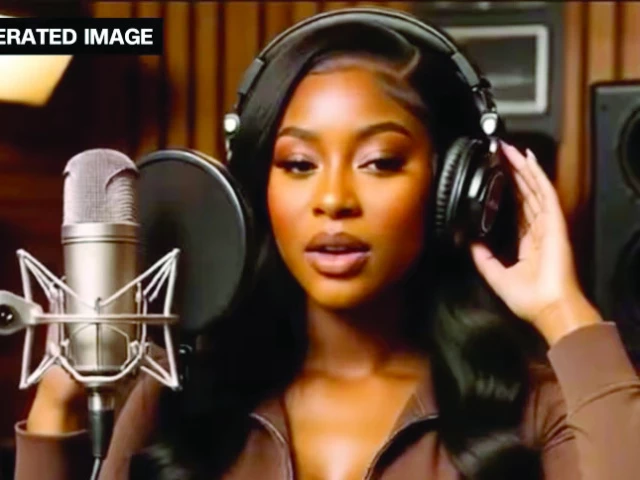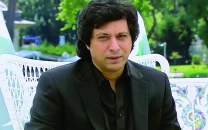AI singer breaks Billboard barrier
Xania Monet becomes first virtual artist to debut on a radio chart

In what Billboard has called a potentially historic moment, 'How Was I Supposed to Know?' by Xania Monet has become the first song by an AI-generated artist to debut on a Billboard radio airplay chart — entering at No 30 on the Adult R&B Airplay survey dated November 1.
Created by Mississippi-based poet and songwriter Telisha 'Nikki' Jones, Xania Monet is described as an AI figure modelled on the style of contemporary R&B singers such as Keyshia Cole and Muni Long.
Her soulful delivery and emotional range are powered by Suno, an artificial intelligence music generation platform that converts text prompts into songs. Jones, who writes all of Monet's lyrics, insists she sees the technology as an instrument, not a replacement for human artistry. "AI is the new era that we're in," she told CBS Mornings. "I look at it as a tool, as an extension of myself."
The single first went viral on TikTok before climbing to No 1 on Billboard's R&B Digital Song Sales chart in September, followed by a Top 20 debut on Hot R&B Songs. Now, its leap into traditional radio marks a turning point — proof that artificial artists can compete in spaces long dominated by human performers.
For Romel Murphy, Monet's manager, this success was achieved through conventional means. "Her song is resonating with the masses," he said. "If you had a traditional artist, radio would still be a piece of the promotion strategy. We're doing the same." Monet's sudden rise has also translated into commercial reward. In September, Jones signed a multimillion-dollar record deal with Hallwood Media after what industry insiders described as a bidding war reportedly worth up to $3 million.
The label has since promoted the executive who signed her to head of A&R, signalling how seriously major companies are betting on AI talent. Hallwood, in a statement, called Monet and other AI-generated artists "the future of music," suggesting the technology opens doors for creators who "might not have had a traditional path into the industry."
Still, the emergence of virtual musicians has sharply divided the music world. R&B star Kehlani has been among the loudest critics, accusing AI acts of exploiting copyrighted material without crediting the real artists whose work trains these systems.
"Nothing and no one on Earth will ever be able to justify AI to me," she said in a now-deleted TikTok video. Others, such as Nettwerk Music Group's co-founder Terry McBride, have dismissed AI artists outright. "That's not going to be a touring entity," McBride told Billboard. "Even if it did hundreds of millions of streams, we have no interest in that."
Yet Xania Monet is not an isolated case. Billboard reports that at least six AI or AI-assisted acts have landed on its charts in recent months, including the country music project Breaking Rust, the Christian artist Juno Skye, and Enlly Blue in the rock category.
Many of these virtual performers maintain their own social media accounts, presenting themselves as real people recording in studios or performing live. Monet's own Instagram page, which has amassed more than 140,000 followers, regularly posts in character — captioning clips with "I write music," even though she is entirely synthetic.
This new frontier has raised practical questions, too. With streaming platforms like Spotify lacking policies on how AI-generated songs collect royalties, these projects can earn revenue like any other artist. Billboard estimated that Monet's early catalogue, which includes her album 'Unfolded' and EP 'Pieces Left Behind,' has already generated more than $50,000 from US streams alone.
Beyond music, AI-created personas have also begun infiltrating Hollywood. The AI actress Tilly Norwood, launched by the studio Xicoia, drew swift backlash from the SAG-AFTRA actors' union, which declared that "creativity is, and should remain, human-centred."
Stars including Emily Blunt and Whoopi Goldberg condemned the idea, echoing concerns now being voiced in the music industry. Murphy, however, argues that the anxiety is misplaced. "AI doesn't replace the artist," he said. "It doesn't diminish creativity or take away from the human experience. It's just a new frontier."
He compared Monet's continued reach to the enduring appeal of legends such as Michael Jackson and Prince. "They're no longer with us, yet new generations still connect to their music," he said. "Music has to evolve as well."
For now, Xania Monet remains both a phenomenon and a test case — the first AI singer to make it onto a Billboard radio chart and, in doing so, to challenge the definition of what it means to be a recording artist. Whether she represents a passing novelty or the future of popular music may depend not on algorithms, but on how willing audiences — and the industry — are to embrace a performer who doesn't exist.





















COMMENTS
Comments are moderated and generally will be posted if they are on-topic and not abusive.
For more information, please see our Comments FAQ